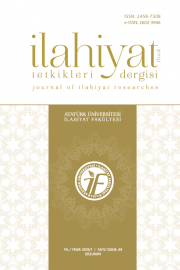İbn Sînâ Metafiziğinde Nefs-Beden Düalizmi Üzerine Bir Zihin Felsefesi Değerlendirmesi
A Philosophy of Mind Evaluation on Soul-Body Dualism in Avicenna’s Metaphysics
Author(s): Mehtap DoğanSubject(s): Philosophy, Epistemology, Theology and Religion, Ancient Philosphy, Philosophy of Middle Ages, Early Modern Philosophy, Middle-East Philosophy, Philosophy of Mind
Published by: Atatürk Üniversitesi İlahiyat Fakültesi
Keywords: Islamic Philosophy; Philosophy of Mind; Avicenna; Descartes; Soul; Mind-Body Problem;
Summary/Abstract: Soul has been a huge problem in history of philosophy within the context of its description, existence, immortality and its relationship with body since the ancient times. Avicenna’s theory on soul could be evaluated as a bridge between his epistemological and ontological ideas. Although his theory has similar characteristics with Plato’s and Aristoteles’ philosophical arguments on soul, Avicenna offers a significant schema on soul that really exceeds both Plato and Aristoteles. Avicenna proposed a systematical analysis of mind-body problem decades before Descartes, who has been known as the constructer of mind-body problem. Therefore, it should be taken into an account that Avicenna although lived in Middle-ages, made a significant contribution to both psychology and philosophy of mind indirectly. The aim of this essay is firstly to evaluate Avicenna’s soul theory concerning the description of soul, the nature of soul, types of soul and the functions of soul and then to search for its effects on modern philosophy of mind. Especially it is easy to realize that there is an explicit similarity between Descartes and Avicenna’s ideas on soul. On the issue of mind-body problem, Descartes claims that mind could exist without the existence of body. Mind is a separate and distinct substance; however, there is a mutual relationship between mind and body through pineal gland. Similar with Descartes, Avicenna also claims that soul can exist without body because it is a distinct substance. He constructs a ground for this idea by using his popular thought experiment “flyman”. In this essay, it is tried to be indicated that Avicenna’s theory of soul has important reflections both on Descartes and modern philosophy of mind
Journal: İlahiyat Tetkikleri Dergisi
- Issue Year: 2018
- Issue No: 49
- Page Range: 161-184
- Page Count: 24
- Language: Turkish

